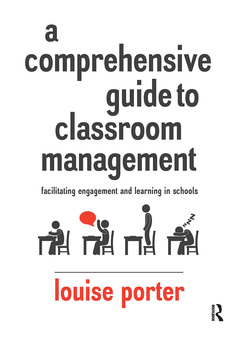A Comprehensive Guide to Classroom Management Facilitating engagement and learning in schools
Auteur : Porter Louise

Behaviour management in the classroom can be one of the most challenging aspects of teaching, but with the right approach it can be rewarding and enriching for both student and teacher. A Comprehensive Guide to Classroom Management provides a systematic overview of the major theories and styles of discipline in schools.
Drawing on the latest international research, Porter outlines how teachers can develop a personal style in classroom management based on a sound understanding of theory. The emphasis is on proactive, authoritative approaches to discipline to engage students and facilitate the achievement of educational and social goals. Porter demonstrates how it is within the power of schools and teachers to create the conditions under which even disadvantaged or disenchanted students strive to learn.
A Comprehensive Guide to Classroom Management is the essential handbook for preservice teachers and a valuable reference for more experienced teachers who want to develop their approach to complex behavioural challenges.
Figures
Tables
Boxes
PART ONE: OVERVIEW
1 The nature and causes of behavioural difficulties in schools
2 Styles of teaching and discipline
PART TWO: CONTROLLING DISCIPLINE
3 Overview of the controlling model
4 Strengthening appropriate behaviours
5 Reducing inappropriate behaviours
6 Classroom discipline
7 Targeted interventions
8 Individualised interventions
9 Critique of behaviourism
PART THREE: THE GUIDANCE APPROACH
10 Overview of the guidance approach
11 Meeting students' basic needs: Wellbeing and safety
12 Meeting students' need for self-esteem: Worth and competence
13 Meeting students' social needs: Affiliation and connection
14 Meeting students' need for autonomy: Voice and choice
15 Meeting students' 'luxury' needs: Purpose and happiness
16 Facilitating learning: Mastery and accomplishment
17 Compassionate communication
18 Providing support
19 Revealing solutions
20 Critique of the guidance approach
PART FOUR: APPLICATIONS
21 Attention deficits
22 Resolving aggression and bullying
PART FIVE: BEYOND THE CLASSROOM
23 Collaborating with parents
24 Supporting teachers
25 Formulating policy about student behaviour
Louise Porter has over 30 years' experience as a child and clinical psychologist. She is an adjunct senior lecturer in Education at Flinders University and is the author of Gifted Young Children and Teacher-parent collaboration.
Date de parution : 03-2021
17.8x25.4 cm
Thèmes d’A Comprehensive Guide to Classroom Management :
Mots-clés :
Chronic; behavioural difficulties; Follow; classroom management; Target Behaviour; social goals; Attention Deficit Disorder; controlling model; Violate; complex behavioural challenges; Extra-curricular; Functional Behaviour Assessment; Guidance Approach; Differential Reinforcement; PBS; Functional Assessment; Token Economy; Tangible Reinforcers; Disengage; Backup Reinforcer; Response Cost Procedures; Low Professional Efficacy; Functional Behaviour Analysis; School Wide Positive Behavioural Support; Mastery Goals; FBA; Attention Deficit Symptoms; Impulse Control; Behaviour Support Plan; Emotional Meltdowns



